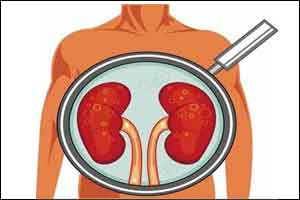- Home
- Editorial
- News
- Practice Guidelines
- Anesthesiology Guidelines
- Cancer Guidelines
- Cardiac Sciences Guidelines
- Critical Care Guidelines
- Dentistry Guidelines
- Dermatology Guidelines
- Diabetes and Endo Guidelines
- Diagnostics Guidelines
- ENT Guidelines
- Featured Practice Guidelines
- Gastroenterology Guidelines
- Geriatrics Guidelines
- Medicine Guidelines
- Nephrology Guidelines
- Neurosciences Guidelines
- Obs and Gynae Guidelines
- Ophthalmology Guidelines
- Orthopaedics Guidelines
- Paediatrics Guidelines
- Psychiatry Guidelines
- Pulmonology Guidelines
- Radiology Guidelines
- Surgery Guidelines
- Urology Guidelines
Novel treatment benefits patients with metabolic acidosis and kidney disease

Patients with chronic kidney disease (CKD) often develop a condition called metabolic acidosis, which is characterized by an imbalance in acid production relative to excretion. A new study appearing in an upcoming issue of the Clinical Journal of the American Society of Nephrology (CJASN) points to a novel treatment for metabolic acidosis that may be a safe and effective alternative to current therapies.
In patients with CKD, metabolic acidosis accelerates the progression of kidney disease toward kidney failure, increases muscle breakdown, worsens bone disease that accompanies kidney failure, and can increase the risk of early death. Metabolic acidosis is diagnosed by a lower than normal serum bicarbonate concentration and treatment often involves alkali supplementation with oral sodium bicarbonate; however, this treatment often requires ingesting large amounts of sodium that may worsen hypertension and fluid overload and may lead to worsening of edema and congestive heart failure in CKD patients with these common comorbidities. Other alkali compositions such as sodium citrate, potassium bicarbonate, and calcium carbonate have also been suggested, but they deliver significant amounts of sodium, potassium, or calcium to the patient.
In a study sponsored by the manufacturer of the drug, Tricida Inc., David Bushinsky, MD (University of Rochester School of Medicine) and his colleagues tested a novel approach to treating metabolic acidosis: oral administration of a non-absorbed polymer called TRC101 that binds to and eliminates acid from the gastrointestinal tract and thereby increases serum bicarbonate. "In contrast to sodium bicarbonate and other compositions that neutralize acid while also delivering sodium or other counterions, TRC101 was designed to selectively bind hydrochloric acid in the gastrointestinal tract and excrete the bound hydrochloric acid along with the feces without delivering any counterion," explained Dr. Bushinsky.
In their first-in-human trial, the researchers randomized 135 patients with CKD and metabolic acidosis who were on a controlled diet to 14 days with placebo or 1 of 4 TRC101 dosing regimens (1.5 g, 3 g, or 4.5 g twice daily; 6 g once daily). After treatment, patients were discharged and followed for 7-14 days.
All TRC101 regimens increased serum bicarbonate from baseline to the end of treatment in a statistically significant and clinically meaningful manner, with most of the patients on TRC101 seeing greater than 3 mEq/L increases from baseline within two weeks. Further, all TRC101 treatment groups showed a significant increase in serum bicarbonate within 72 hours of the first dose. Among patients taking TRC101, serum bicarbonate was normalized at the end of treatment in 35% of patients and increased by at least 4 mEq/L in 39% of patients. After discontinuation of TRC101, serum bicarbonate decreased nearly to baseline levels within 2 weeks. All adverse events were mild or moderate, with gastrointestinal events most common. Importantly, serum electrolytes other than serum bicarbonate (such as sodium, potassium, and calcium) did not change during treatment with TRC101, and all patients completed the study.
"This study demonstrated that TRC101 was well-tolerated in CKD patients with metabolic acidosis, and treatment with TRC101 led to a rapid and sustained mean increase in serum bicarbonate," said Dr. Bushinsky. "If longer-term studies support these initial results, TRC101, a novel, counterion-free, non-absorbed polymer, may be an important new therapeutic approach for the treatment of chronic metabolic acidosis in CKD patients."
In an accompanying editorial, Denver Brown, MD and Michal Melamed, MD, MHS (Albert Einstein College of Medicine/Montefiore Medical Center) noted that additional studies should also include more diverse patients, including racial/ethnic minorities, and those with higher blood pressure and glucose levels than in the current study. "Hopefully the introduction of TRC101 will lead to continued interest in understanding how and why nephrologists should treat metabolic acidosis in CKD," they wrote.

Disclaimer: This site is primarily intended for healthcare professionals. Any content/information on this website does not replace the advice of medical and/or health professionals and should not be construed as medical/diagnostic advice/endorsement or prescription. Use of this site is subject to our terms of use, privacy policy, advertisement policy. © 2020 Minerva Medical Treatment Pvt Ltd